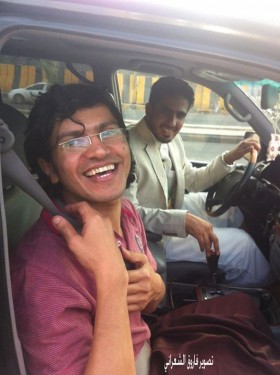Home » Yemen » Press Releases » YEM - News » Yemen: High-profile Journalist Haider Shaye Released after 3 Years of Detention and Torture
The news of his release was met with an outpouring of emotion by fellow journalists and human rights activists as they welcomed him outside the prison. Many of them have been calling for his release and protesting in Sanaa against his imprisonment since his arrest.
Shaye was arrested on 16 August 2010 and disappeared for over two months, period during which he was tortured and mistreated by officials, including agents from the National and Political Security services. They threatened that if he did not cooperate with them and accept to be their informer, they would destroy his life. Shaye refused.
In January 2011, he was sentenced by a special court to 5 years of imprisonment, and 2 years of travel ban and house arrest on charges of being an Al-Qaida operative.
Abdulillah Shaye is well-known amongst human rights activists and journalists for his investigative reporting on the 2009 drone attack on Al-Majalah as well as his ability to establish contacts with Islamist groups.
At his first hearing, Shaye declared that his arrest and trial were only the result of his reporting on these strikes carried out by Yemen and the United States of America at the end of 2009 which caused the death of dozens of Yemeni civilians. His investigative work was reportedly used as evidence for his conviction.
Shaye's sentence provoked an outcry amongst tribal leaders, local and international human rights activists, journalists and human rights NGOs, many of whom have been protesting for months against his unfair sentence and imprisonment. This mobilization led former president Ali Abdullah Saled to pardon the journalist several weeks after his sentence. However, this decision was not implemented at the time as U.S. President Obama expressed "his concern over the release".
Since his arrest, Alkarama has been following Shaye's case, sending information on his situation to the United Nations and taking part in advocacy efforts carried out by local activists and journalists.
The Yemeni authorities should lift the penalties of travel-ban and house arrest.
 Algeria
Algeria Bahrain
Bahrain Djibouti
Djibouti Egypt
Egypt Iraq
Iraq Palestine/Israel
Palestine/Israel Jordan
Jordan Kuwait
Kuwait Lebanon
Lebanon Libya
Libya Mauritania
Mauritania Morocco
Morocco Oman
Oman Qatar
Qatar Saudi Arabia
Saudi Arabia Sudan
Sudan Syria
Syria Tunisia
Tunisia United Arab Emirates
United Arab Emirates Yemen
Yemen Other Countries
Other Countries


